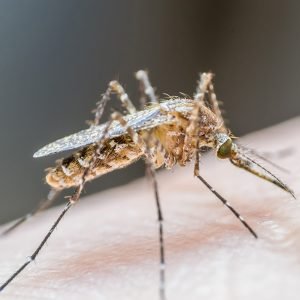 Worldwide, mosquitoes are responsible for more death and disease than any other animal. At your backyard barbecue or pool party, they’re unwanted guests that can range from a mere nuisance to a legitimate health hazard.
Worldwide, mosquitoes are responsible for more death and disease than any other animal. At your backyard barbecue or pool party, they’re unwanted guests that can range from a mere nuisance to a legitimate health hazard.
Unlike many pests, which are just that, mosquitoes can be carriers of disease, even in areas like Ohio that would never be confused with tropical. They’re most active in the Buckeye State in warm months, typically May through October (or whenever the fall sees its first hard frost). Ohio has 59 species of mosquito, some of which can transmit encephalitis and West Nile virus in humans and heartworms in dogs, making preventative steps paramount.
And if you’re one of those people who feel like mosquitoes are always buzzing around you—you may not be wrong. Mosquitoes are indeed attracted to certain types of people, making you even more of a target when camping, hiking, or just trying to enjoy an evening on the deck.
Who are mosquitoes most attracted to?
Mosquitoes home in on targets using sight and smell, and researchers have learned that roughly a quarter of people are indeed more susceptible to being bitten. So what factors contribute to making certain people more of a bull’s eye for the buzzing beasts of the backyard? 
- Blood type—Mosquitoes are after the proteins in human blood, and they like some types more than others. A 2004 study by Japan’s Institute of Pest Control Technology found that mosquitoes love Type O blood, biting people with that type twice as much as those with Type A, and also noticeably more than those with Type B.
- Metabolism—Anyone who’s ever finished an evening run knows mosquitoes are attracted to sweat and body heat. That makes people who are exercising – or even people who just exercise regularly – more of a target, because mosquitoes can sense all the heightened metabolic substances that drive them wild.
- Clothes color—Since mosquitoes use vision to identify their targets, dark clothes may be a factor in helping them decide whom to bite, according to research by one University of Florida entomologist. That means black, dark blue or red clothes may help you stand out for the wrong reasons.
- Size—One way mosquitoes locate their victims is by carbon dioxide exhaled while breathing, and larger people tend to emit more of it. The same factor can make pregnant women more susceptible to mosquito bites as well.
So how do I get rid of mosquitoes?
If you’re an avid runner with Type O blood who likes to wear black and also may be pregnant, you’re a mosquito’s dream. Any one of those factors, though, can make you more likely to be bitten than the average person, all of which makes mitigation important. So what steps can you take to reduce your chances of being bitten in the first place?
- Use repellant—Start by using a repellant approved by the Environmental Protection Agency, and containing active ingredients such as DEET or Picaridin. Just take caution when using them on children; spray the repellant on your hands and wipe it on the kids, and don’t spray any on children’s hands.
- Treat clothing—Especially if you’re going camping or hiking, consider treating boots and pants with permethrin, an anti-parasitic compound. Just don’t apply the product directly on the skin.
- Secure your home—To keep mosquitoes outside, repair any holes in screens and keep windows closed during the times of day when mosquitoes are most active. And be aware of anything that collects standing water—like buckets, toys, and even birdbaths—which breeds the types of mosquitoes most likely to carry disease.
- Consider yard treatment—Of course, all those steps still won’t keep the mosquitoes away from your back deck in the evening. That’s why it might be wise to consider a property-wide treatment approach, which typically keeps mosquitoes at bay for about 2-4 weeks after each application.
Protect you and your family
Mosquito prevention doesn’t just make your backyard more enjoyable—it also offers a greater degree of protection for you and your family. Mosquito-borne diseases that are found in Ohio include West Nile virus, which can cause fever, nausea and body aches; La Crosse virus, which is endemic in Ohio and can cause fever, vomiting and lethargy; and two types of encephalitis, which are brain infections. Having your home checked regularly as part of a pest prevention program can help ensure that mosquitoes or other pests don’t become a problem. Keeping mosquitoes at bay begins with proactive evaluation and regular treatment.
To learn more about treating mosquitoes, or about a general pest prevention system, call A-1 Able Pest Doctors at (800) 737-8189.
Tags: Mosquito Control Mosquitos

Recent Comments